方位介词与时间介词专项
语法专项之有关介词及介词短语的考点

I have studied English since 10 years ago. 从十年前就开始学英语了。
考点2 表示地点和方位的介词
1. 地点介词at与in 介词 用法 at at+小地点(车站、电影院等) in in+大地点(洲名、国家名、城市名等)
考点2 表示地点和方位的介词
2. in, on与to 介词 用法
afer+时间段,表示“在......之后”,常与过去时连用
in in+时间段,“多久以后”,常与将来时连用,用how soon提问 如: After an hour I went home.一个小时后我回家了。
I’ll go home in an hour.我一小时后回家。
考点1 表示时间的介词
在......期间
during the 1990s
考点4 其他常见介词
介词 for
用法 为了;给;对 支持;拥护 因为;由于 表示一段时间
对......来说
示例 fight for be for be famous for for a few days
It’s + adj. + for sb. to do sth.
考点2 表示地点和方位的介词
5. above, over与on
三者作介词,都有“在......上面”之意,区别如下:
介词 用法
图示
above over
不一定是正上方,反义词为 below 垂直悬空,正上方
on
指接触物体表面或构成物体
表面的一部分
考点3 表示方式、手段或工具的介词
1. by, in与on表示交通方式
in in a hurry 匆忙地;in a word 简言之,一句话,总之;in danger 处于危险之中;in English 用英语;in fact 事实上,实际上;in half 分成两半;in need 处于困境中;需要帮助;in peace 和平 地;in person 亲身;亲自;in public 公开地;在别人(尤指生 人)面前;in silence 沉默;无声;in surprise 惊讶地;in trouble 有麻烦,处于困境
初中英语介词专项
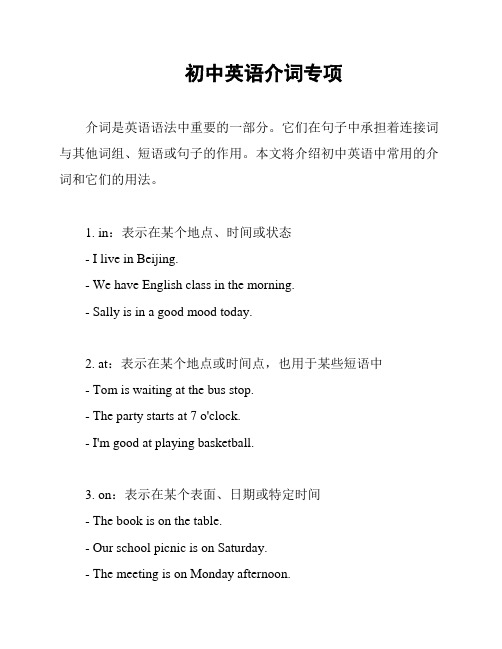
初中英语介词专项介词是英语语法中重要的一部分。
它们在句子中承担着连接词与其他词组、短语或句子的作用。
本文将介绍初中英语中常用的介词和它们的用法。
1. in:表示在某个地点、时间或状态- I live in Beijing.- We have English class in the morning.- Sally is in a good mood today.2. at:表示在某个地点或时间点,也用于某些短语中- Tom is waiting at the bus stop.- The party starts at 7 o'clock.- I'm good at playing basketball.3. on:表示在某个表面、日期或特定时间- The book is on the table.- Our school picnic is on Saturday.- The meeting is on Monday afternoon.4. by:表示通过某种方式或通过某种交通工具- We went to school by bus.- He sent the message by email.- She solves math problems by using a calculator.5. with:表示与某人一起或用某物- I went to the movie with my friends.- Can you write with a pen?- Sarah cooked dinner with fresh ingredients.6. from:表示起点或来源- The train departs from Shanghai.- This gift is from my parents.- I learned English from my teacher.7. to:表示方向、目的地或目标- Lisa walked to the park.- We are going to the supermarket.8. for:表示目的、利益或时间段- I bought this book for studying English.- He exercises for his health.- The party lasted for four hours.以上是初中英语中常见的介词及其用法。
高三方位介词知识点
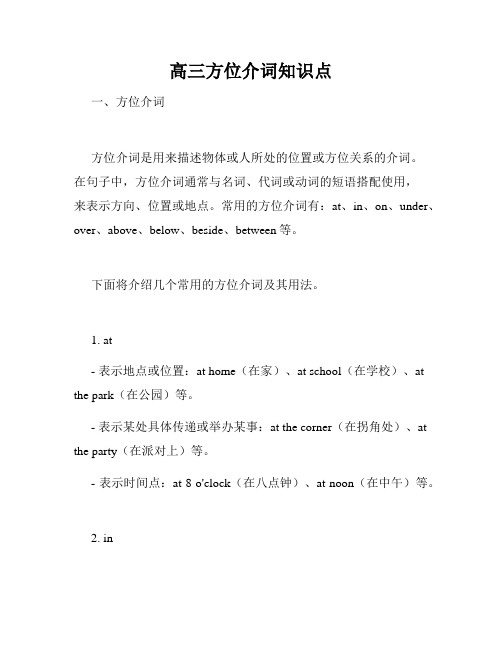
高三方位介词知识点一、方位介词方位介词是用来描述物体或人所处的位置或方位关系的介词。
在句子中,方位介词通常与名词、代词或动词的短语搭配使用,来表示方向、位置或地点。
常用的方位介词有:at、in、on、under、over、above、below、beside、between等。
下面将介绍几个常用的方位介词及其用法。
1. at- 表示地点或位置:at home(在家)、at school(在学校)、at the park(在公园)等。
- 表示某处具体传递或举办某事:at the corner(在拐角处)、at the party(在派对上)等。
- 表示时间点:at 8 o'clock(在八点钟)、at noon(在中午)等。
2. in- 表示在某一大范围内,用于较大的空间:in Beijing(在北京)、in the living room(在客厅)等。
- 用于特定的场所:in the library(在图书馆)、in a box(在盒子里)等。
3. on- 表示在表面、接触到或覆盖在某物上:on the table(在桌子上)、on the wall(在墙上)等。
- 表示交通工具:on a bus(在公交车上)、on a plane(在飞机上)等。
- 表示特定的日子或日期:on Monday(在星期一)、on New Year's Day(在元旦)等。
4. under- 表示位于某物之下:under the bed(在床下)、under the tree (在树下)等。
- 表示被遮挡:under the umbrella(在伞下)、under the shadow (在阴影下)等。
5. over- 表示位于某物之上:over the bridge(在桥上)、over the sky (在天空中)等。
- 表示水平位置:over there(在那边)等。
6. above- 表示在高于某物之上:above the clouds(在云上方)、above sea level(在海拔多少米之上)等。
时间介词方位介词练习题
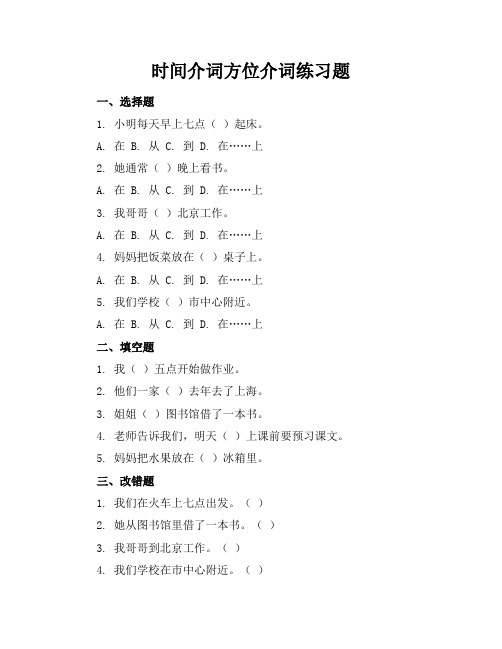
时间介词方位介词练习题一、选择题1. 小明每天早上七点()起床。
A. 在B. 从C. 到D. 在……上2. 她通常()晚上看书。
A. 在B. 从C. 到D. 在……上3. 我哥哥()北京工作。
A. 在B. 从C. 到D. 在……上4. 妈妈把饭菜放在()桌子上。
A. 在B. 从C. 到D. 在……上5. 我们学校()市中心附近。
A. 在B. 从C. 到D. 在……上二、填空题1. 我()五点开始做作业。
2. 他们一家()去年去了上海。
3. 姐姐()图书馆借了一本书。
4. 老师告诉我们,明天()上课前要预习课文。
5. 妈妈把水果放在()冰箱里。
三、改错题1. 我们在火车上七点出发。
()2. 她从图书馆里借了一本书。
()3. 我哥哥到北京工作。
()4. 我们学校在市中心附近。
()5. 妈妈把饭菜在桌子上。
()四、连线题请将下列时间介词与方位介词正确搭配:A. 在 1. 从B. 从 2. 到C. 到 3. 在……上1. 我()家里出发去学校。
2. 她把书()桌子上。
3. 我们()明天见面。
五、翻译题1. 请翻译:我在图书馆找到了那本书。
2. 请翻译:她从北京回来了。
3. 请翻译:我们明天早上八点出发。
六、匹配题请将下列句子与正确的时间介词或方位介词匹配:1. 他通常在周末去爬山。
2. 我们下午两点在公园见面。
3. 她住在五楼。
4. 学生们应该在上课前做好准备。
5. 他们沿着河边散步。
A. 在B. 在……上C. 从D. 到七、完成句子1. ___________六点,我要去跑步。
2. 我们___________超市买了些水果。
3. 她把照片___________墙上挂起来。
4. ___________夏天,天气特别热。
5. 他___________国外留学回来了。
八、单项选择题1. 我妈妈每天()做早餐。
A. 在B. 从C. 到D. 在……上2. 春节()中国传统的节日。
A. 在B. 从C. 到D. 在……上3. 你看,那架飞机()天上飞。
中考英语二轮复习+++时间介词和方位介词

第一节表示时间的介词用适当介词填空1. There are four seasons______a year.2. The supermarket is open______ 8:00A.m______.9:00 p.m.3. I bought some flowers for my mother______Mothen's Day.4. My father has worked in this hospital ______ twenty years ago.5. My brother will be back from Australia______a few days.6. I was born____December 9th, 2002.7. We don't go to school ______Sundays.8. The accident happened ______ a dark night.9. It's very cold______ the morning, but it turns warm_____ noon.10. The plane to Beijing leaves______three p.m.11.I saw the movie______ the end of last month.12. They visited us______ July.13.My aunt arrived in Sidney ______the night of January 2nd.14. I have learnt English______ten years.15. What time do you get up______the weekend?16. I usually play football with my friends______ Friday afternoon.17. I have lived here______ last September.18. what were you doing_____that time?19.They had built a new bridge______ the end of last year.20. It always snows here ______this time of year.第二节表示地点的介词用适当介词填空1. We had a great time ______the party.2. I usually stay ______home on Sundays.3. There are two maps ______the wall.4. I had a pain ______ my leg this morning.5. My uncle lives ______a farm6. My younger sister studies ______Class Eight.7.There are many trees ______both sides of the street.8. ______China,family name comes first, given name comes last.9.I met an old friend ______the street yesterday.10.There is no milk ______the fridge, let's go and buy some.11. Turn right ______the second crossing.12. You’ll find the train station ______the end of the street.13.What's ______TV tonight?14.Please write your address ______zpiece of paper.15.I saw a traffic accident______my way home.16. Let's meet ______ the school gat te tomorrow morning.17.I have read the news ______the newspaper.18. How far is it ______Beijing ______Guangzhou?19. Can you tell me the differences ______American English and British English?20. The head teacher called Ann ______go to his office.。
小升初时间介词方位介词(讲义)译林版英语六年级下册
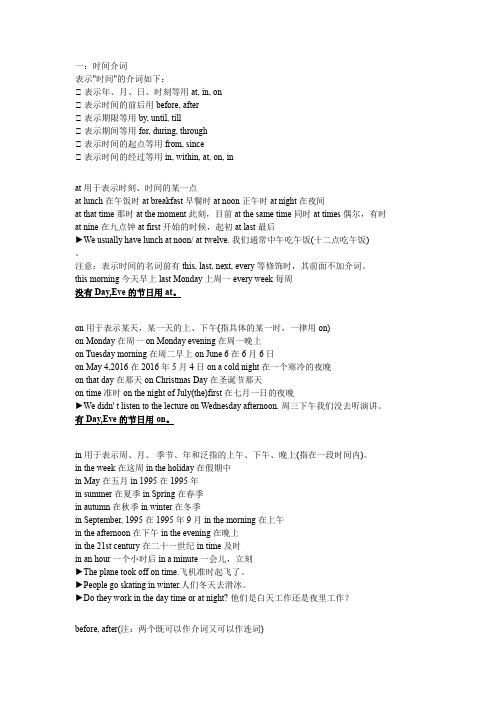
一:时间介词表示"时间"的介词如下:①表示年、月、日、时刻等用at, in, on①表示时间的前后用before, after①表示期限等用by, until, till①表示期间等用for, during, through①表示时间的起点等用from, since①表示时间的经过等用in, within, at, on, inat用于表示时刻、时间的某一点at lunch在午饭时at breakfast早餐时at noon正午时at night在夜间at that time那时at the moment此刻,目前at the same time同时at times偶尔,有时at nine在九点钟at first开始的时候,起初at last最后►We usually have lunch at noon/ at twelve.我们通常中午吃午饭(十二点吃午饭)。
注意:表示时间的名词前有this, last, next, every等修饰时,其前面不加介词。
this morning今天早上last Monday上周一every week每周没有Day,Eve的节日用at。
on用于表示某天,某一天的上、下午(指具体的某一时,一律用on)on Monday在周一on Monday evening在周一晚上on Tuesday morning在周二早上on June 6在6月6日on May 4,2016在2016年5月4日on a cold night在一个寒冷的夜晚on that day在那天on Christmas Day在圣诞节那天on time准时on the night of July(the)first在七月一日的夜晚►We didn' t listen to the lecture on Wednesday afternoon.周三下午我们没去听演讲。
有Day,Eve的节日用on。
方位介词知识点总结

方位介词知识点总结常见的方位介词有:in, on, at, by, near, next to, between, behind, in front of, above, below, under, over等。
下面将分别介绍它们的用法和搭配。
1. in介词"in"用来表示物体在某个范围或空间之内。
比如:- There is a cat in the box.(盒子里有一只猫。
)- She is in the living room.(她在客厅里。
)"in"还可以用来表示某个月、季节、年代或年龄段。
比如:- I was born in 1990.(我是1990年出生的。
)- We have a party in December.(我们在12月份举办派对。
)2. on介词"on"用来表示物体在某个平面或表面上。
比如:- There is a cup on the table.(桌子上有一个杯子。
)- The book is on the shelf.(书放在书架上。
)此外,“on”还可以表示抽象的位置,比如:- He is on the phone.(他在打电话。
)3. at介词"at"用来表示物体在某个具体的位置。
比如:- I am at home.(我在家。
)- We will meet at the cafe.(我们会在咖啡馆见面。
)"at"还可以表示某个时间点。
比如:- Let's meet at 7 o'clock.(我们7点见。
)- I will see you at lunchtime.(午餐时间见。
)4. by介词"by"用来表示通过某个方式或交通工具来到某个地方。
比如:- He came by bus.(他乘公交车来了。
)- We can go by train.(我们可以坐火车去。
初中英语七年级方位介词详解及练习
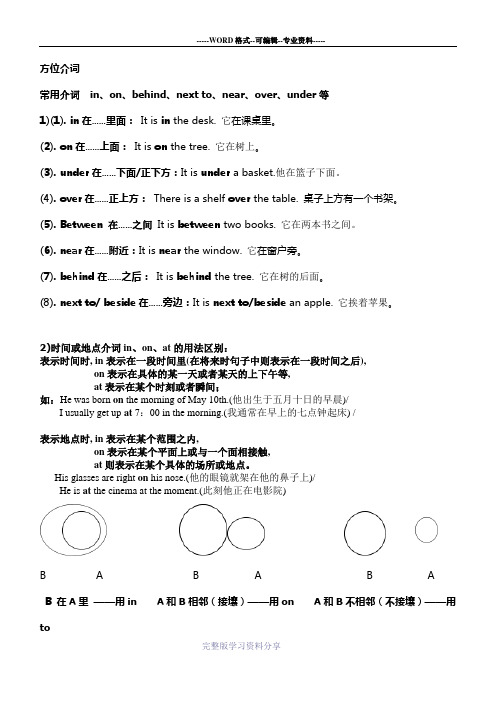
方位介词常用介词in、on、behind、next to、near、over、under等1)(1). in在……里面:It is in the desk.它在课桌里。
(2). on在……上面:It is on the tree.它在树上。
(3). under在……下面/正下方:It is under a basket.他在篮子下面。
(4). over在……正上方:There is a shelf over the table.桌子上方有一个书架。
(5). Between 在……之间It is between two books. 它在两本书之间。
(6). near在……附近:It is near the window. 它在窗户旁。
(7). behind在……之后:It is behind the tree. 它在树的后面。
(8). next to/ beside在……旁边:It is next to/beside an apple. 它挨着苹果。
2)时间或地点介词in、on、at的用法区别:表示时间时, in表示在一段时间里(在将来时句子中则表示在一段时间之后),on表示在具体的某一天或者某天的上下午等,at表示在某个时刻或者瞬间;如:He was born on the morning of May 10th.(他出生于五月十日的早晨)/I usually get up at 7:00 in the morning.(我通常在早上的七点钟起床) /表示地点时, in表示在某个范围之内,on表示在某个平面上或与一个面相接触,at则表示在某个具体的场所或地点。
His glasses are right on his nose.(他的眼镜就架在他的鼻子上)/He is at the cinema at the moment.(此刻他正在电影院)B A B A B AB 在A里——用in A和B相邻(接壤)——用on A和B不相邻(不接壤)——用to3) in front of “在…之前”(范围外)in the front of 表示“在…的前部”(范围内)实战演练1. The United States is ____ the south of Canada and ___ the east of Japan.A. to; inB. on; toC. in; besideD. at; on2 . Japan lies____ the east of China.A. on B/ to C. in D. with3. Jiangsu is___ the east of China, but Japan is ___ the east of China.A. to; inB. in; to .C. on; toD. to; on4. There are some trees_________ the classroomThere is a blackboard ____________ the classroom.A. in front ofB. in the front of5. —Look, there are many apples ______ the tree.—Yes. And a boy is picking apples ______ the tree now.A. in; onB. on; inC. in; inD. on; on6. When did you arrive ______school this morning?A. inB. atC. toD. with。
- 1、下载文档前请自行甄别文档内容的完整性,平台不提供额外的编辑、内容补充、找答案等附加服务。
- 2、"仅部分预览"的文档,不可在线预览部分如存在完整性等问题,可反馈申请退款(可完整预览的文档不适用该条件!)。
- 3、如文档侵犯您的权益,请联系客服反馈,我们会尽快为您处理(人工客服工作时间:9:00-18:30)。
方位介词与时间介词专项
一.选择填空。
( )1.Mrs. Brown came to China ____ 1996.
A.from B.of C.to D.in
( )2.The room was full ____ smoke after the big fire.
A.of B.with C.in D.for
( )3. Here are some presents ____ you ____ our best wishes.
A.to; with B. for; with C.of; about D.for; for
( )4. Both Mr Green and Mrs Green were born ____ June, 1956.
A.in B.at C.on D.for
( )5.The little boy is always interested ____ science.
A.with B.by C.in D.at
( )6.Li Lei often gets up ____ seven o'clock on Sundays.
A.on B.in C.at D.for
( )7.They arrived early ____ a Tuesday morning.
A.on B.at C.in D.of
( )8.--When were you born? --I was born ____ August 25, 1983.
A.on B.in C.at D.to
( )9. The classroom is quite different_______that one.
( )10.Let me show you the place ____ the map.
A.with B.on C.in
( )11.He got many gift________his birthday_______his friends.
( )12.The visitors ____ Japan arrived ____ Beijing Station last Tuesday morning.
A.from; at B.of; to C.from; to D.of; on
( )13.It's cold outside. Please__________your warm clothes.
A. put in
B. take off
C. put on
D. put up
( )14. Look, you'll see a bridge__________the river.
( )15. –Your coat looks nice, Is It________cotton?
-Yes. It's________Shanghai.
A. made of, made by
B. made of, made in
C. made for, made in
D. made from, made by
二、用适当的介词填空。
1.What's wrong ____ your watch?
2.One ____ the students is in the classroom.
3.I think the shop is closed ____ this time of day.
4.My father teaches English ____ a school.
5.We have lunch ____ the middle of the day.
6.You can buy some school things ____ your way home.
7.I was born ____ July 1, 1982.
8.Don't sleep ____ the open air.
9.I often help my mother _____ the housework.
10.It's time ____ school.
11.I have quite a lot ____ homework to do.
12.What's the time? It's half ____ seven.
13.Ducks are good ____ swimming.
14.What are you talking ____ ?
15.He is sitting ____ the front of the car.
16.The eraser was passed ____ one student ____ another. 17.Did you live ____ Beijing in 1997?
18.When did you arrive ____ the village?
19. Eating too much isn't good ____ your health.
20.I think Mary is ____ duty today.
21. Thanks ____ asking me to your party.
22.My watch is very different ____ yours.
23.What's the weather ____ today?
24.Let's go out ____ a walk, shall we?
25.I don't know which is the way ____ the park. 26.The people here are very friendly ____ us.
27.I felt a little afraid ____ my teacher.
28.Help yourselves ____ some fish, Lily and Lucy. 29.I'm sorry I'm late ____ the meeting.
30.Don't play ____ fire.It's dangerous.
31.He didn't go ____ bed until twelve o'clock.
32.If you break the window, you'll have to pay ____ it. 33.The glass is full ____ milk.
34.____ Mr Wang's help, I have passed the exam. 35.Please cut the metal ____ some pieces.
36.Are you interested ____ the film Titanic? 37.Hundreds ____ years ago, there was a village here.。
